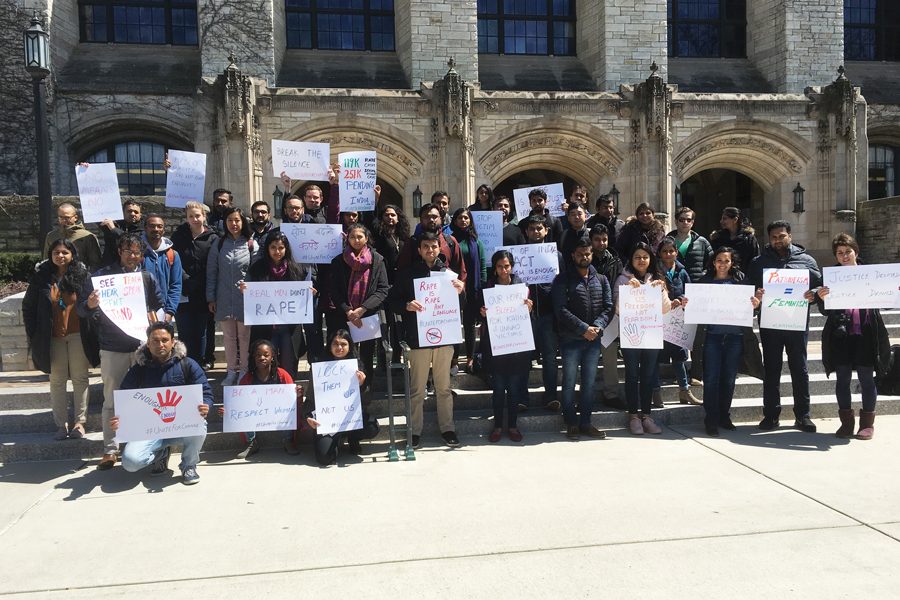Kellogg students march in protest of sexual violence in India
Alan Perez/Daily Senior Staffer
Kellogg student demonstrators stand in front of Deering Library. The demonstrators marched to protest sexual violence in India amid public outcry over government policies regarding sexual assault.
April 20, 2018
Dozens of students marched from the Kellogg School of Management Global Hub to Deering Library on Thursday to protest the Indian government’s response to sexual violence against women.
More than 50 Kellogg students participated in the march, which ended with speeches from Kellogg first-year student Urvashi Goel and second-year student Ashish Kakran. Goel said India needs to address multiple deep-rooted issues, including victim-blaming, pressure to remain silent and unprosecuted cases.
“I want to ask you all to end the rape culture around the world,” Goel told demonstrators. “I want to ask you all to change this … culture of shaming women who have been victims of sexual assault and crimes. Help their voices be heard. Make them feel safe and comfortable. Tell them that you’re with them.”
Goel then asked demonstrators to pull out their phones and tweet to the prime minister of India, Narendra Modi, calling on him to be proactive in addressing sexual assault.
The march comes amid public outcry after two high-profile cases garnered considerable media attention, Goel added, prompting the country to confront a long-ignored problem.
Kakran told The Daily the demonstration aimed to show Modi that Indian citizens around the world also care about the issue. The group coordinated with other business schools that planned on holding their own protests, he said. Dartmouth’s Tuck School of Business also held a demonstration Thursday.
Kellogg first-year student Rahul Garg said the demonstration was coordinated by a group of international students from India, though he said he appreciated that other students showed up to support a widespread issue.
“We wanted to make everyone aware that this can happen to anyone everywhere, this is not something that’s specific to India,” he said. “We wanted the entire Kellogg community because we stand for each other.”
During his speech, Kakran said the group planned to continue conversations about rape culture in India as well as throughout the rest of the world. He asked demonstrators to donate to nonprofit organizations committed to the cause, including Action Aid and Operation Red Alert.
“India has to stop living in denial and embrace its problems to fix them,” he said. “India has to stop blaming the media because we ourselves are to blame. India has to stop looking the other way and (saying) ‘boys will be boys.’ We have to get used to having difficult conversations.”
Garg said the demonstrators also hoped to put pressure on officials before next year’s national election. Many of the Indian government’s sexual assault policies protect perpetrators of violence against women, including government officials who have committed those acts, Goel said. Those policies include low conviction rates, lack of prosecutions and other inefficiencies in the courts, she said.
Such policies and other practices by government officials, especially the police, led to mistrust from the public, she said.
“These are important issues,” she said. “I guess we were just tired of staying silent and tired of these cases coming up again and again and not being able to do anything about them, (so) we decided to take action.”
Email: aperez@u.northwestern.edu
Twitter: @_perezalan_



